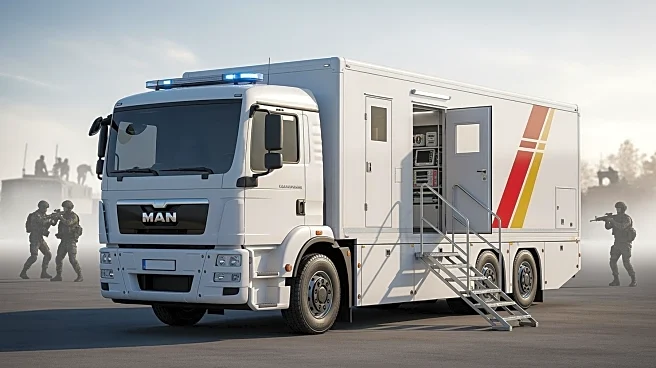What's Happening?
Rheinmetall has been awarded a contract by the Federal Office of Bundeswehr Equipment, Information Technology and In-Service Support (BAAINBw) to supply the German Armed Forces (Bundeswehr) with mobile medical facilities. The agreement, valued at over
€300 million ($349 million), includes six systems designed to meet NATO's Role 2B standards. These units are expected to be delivered as series models starting in 2029 and will be deployed by German troops in Lithuania, among other locations. Each medical facility will consist of 11 vehicles equipped with multifunctional containers, which will remain on military HX trucks produced by Rheinmetall MAN Military Vehicles during operational deployment. The mobility of these units allows for rapid deployment in response to national and alliance defense requirements, providing immediate medical care to severely wounded personnel near the front line.
Why It's Important?
The contract signifies a significant investment in enhancing the medical capabilities of the Bundeswehr, aligning with NATO standards for operational readiness and troop safety. The deployment of these mobile medical units is crucial for providing immediate care in conflict zones, thereby improving survival rates and operational effectiveness. This development also reflects Rheinmetall's strategic role in supporting military operations through advanced technology and infrastructure. The investment in mobile medical facilities underscores the importance of maintaining robust defense capabilities in response to evolving security threats, particularly in regions like Lithuania where NATO presence is critical.
What's Next?
The contract with Rheinmetall runs until 2040, with provisions for additional systems to be ordered, indicating a long-term commitment to enhancing the Bundeswehr's medical infrastructure. As the first units are expected in 2029, Rheinmetall will continue to develop and refine these systems to ensure they meet the required standards. The deployment of these units may prompt other NATO members to consider similar investments in mobile medical facilities, potentially leading to broader adoption of advanced medical technologies within the alliance. Additionally, Rheinmetall's ongoing projects, such as the Boxer Skyranger 30 air defense vehicle, suggest continued innovation and expansion in military technology offerings.
Beyond the Headlines
The introduction of mobile medical units meeting NATO standards highlights the ethical and operational importance of providing adequate medical care in military settings. This development may influence future defense policies and procurement strategies, emphasizing the need for comprehensive medical support in conflict zones. The collaboration between Rheinmetall and the Bundeswehr also reflects broader trends in military modernization, where technology plays a pivotal role in enhancing operational capabilities and troop welfare. As geopolitical tensions persist, investments in such infrastructure could become increasingly vital for maintaining strategic stability and readiness.















